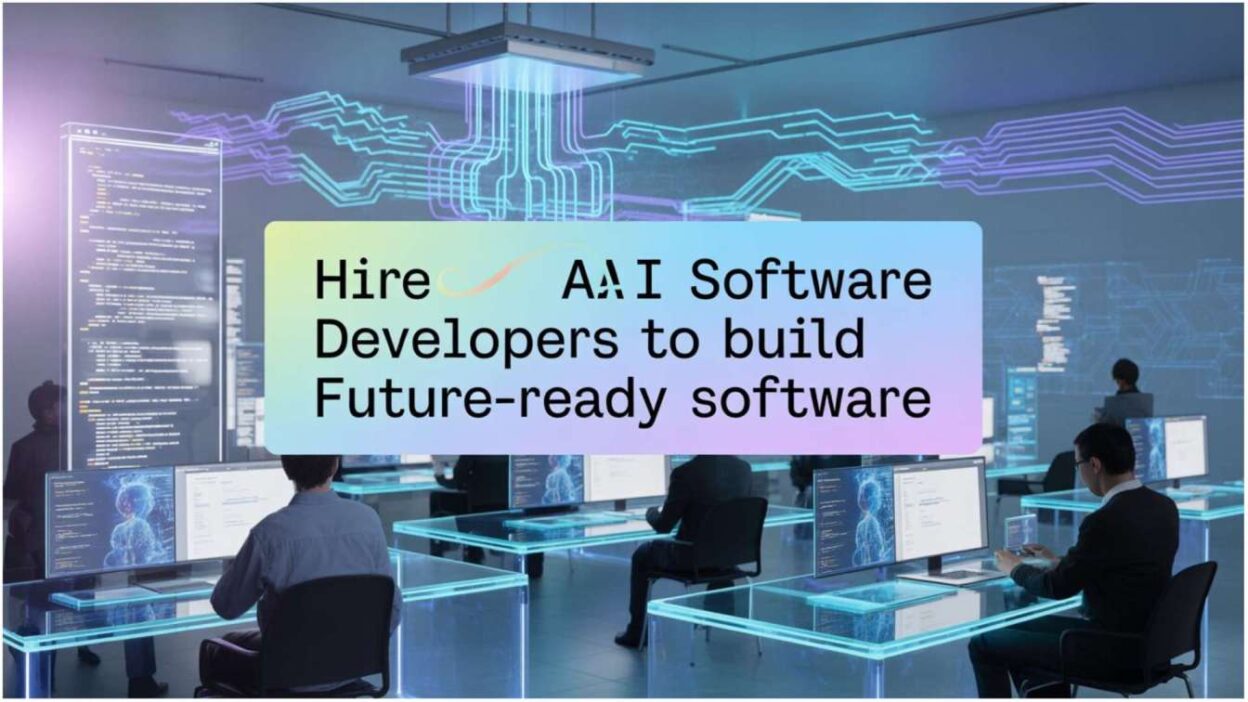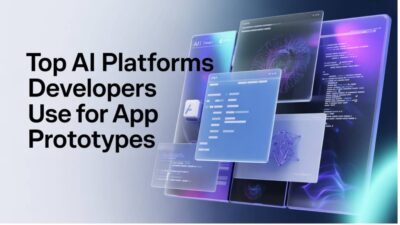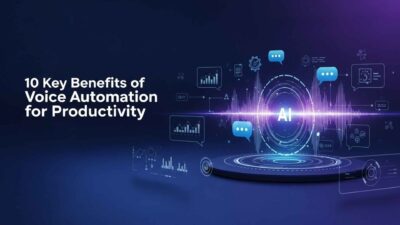Introduction
TL;DR The decision to hire AI software developers determines whether your business thrives or falls behind in the rapidly evolving digital landscape. Artificial intelligence transforms industries at unprecedented speeds while companies without AI capabilities struggle to compete. Traditional software development approaches cannot address the complex challenges that modern businesses face daily.
Table of Contents
AI-powered applications deliver personalized experiences, automate complex processes, and generate actionable insights from massive datasets. Generic software solutions lack the intelligence needed to adapt to changing customer behaviors and market conditions. When you hire AI software developers, you gain access to specialized talent that builds adaptive systems capable of learning and improving continuously.
This comprehensive guide explores everything you need to know about hiring AI development talent for your organization. You will discover essential skills to seek, recruitment strategies, cost considerations, and implementation best practices for building future-ready software solutions.
Understanding the Role of AI Software Developers
AI software developers combine traditional programming expertise with specialized knowledge in machine learning, neural networks, and data science. These professionals design and build intelligent systems that process information and make decisions without explicit programming for every scenario. Modern AI development requires understanding both software architecture and mathematical concepts underlying artificial intelligence algorithms.
Core Responsibilities and Expertise Areas
Machine Learning Model Development AI developers create predictive models that learn from data patterns to make accurate forecasts and classifications. These models power recommendation engines, fraud detection systems, and demand forecasting applications. Skilled developers understand various algorithms and select optimal approaches for specific business problems.
Natural Language Processing Implementation Developers build systems that understand, interpret, and generate human language for chatbots, sentiment analysis, and content generation. NLP expertise enables applications to comprehend context, intent, and emotional nuance in customer communications. Advanced language processing capabilities differentiate superior AI applications from basic automated systems.
Computer Vision Solutions AI developers create applications that analyze and interpret visual information from images and videos. Object recognition, facial detection, and quality control automation rely on sophisticated computer vision algorithms. Visual AI applications transform industries from manufacturing to healthcare diagnostics.
Data Pipeline Engineering Developers construct infrastructure for collecting, cleaning, and preparing data that trains AI models effectively. Quality data pipelines ensure models learn from accurate, representative information rather than biased or incomplete datasets. Strong engineering practices prevent data quality issues that undermine AI system performance.
Technical Skills and Qualifications
Programming Language Proficiency Python dominates AI development due to extensive libraries and frameworks supporting machine learning applications. Developers also work with R, Java, and C++ depending on performance requirements and existing system architectures. Multi-language expertise enables seamless integration with diverse technology stacks.
Framework and Library Mastery TensorFlow, PyTorch, and Keras represent essential frameworks that accelerate AI model development and deployment. Scikit-learn provides traditional machine learning algorithms while specialized libraries address specific AI challenges. Framework knowledge separates experienced AI developers from general programmers learning machine learning basics.
Mathematics and Statistics Foundation Linear algebra, calculus, and probability theory underpin machine learning algorithms and model optimization techniques. Strong mathematical foundations enable developers to understand model behaviors and troubleshoot performance issues effectively. Statistical expertise ensures proper model evaluation and validation procedures.
Cloud Platform Experience Modern AI applications leverage cloud infrastructure from AWS, Google Cloud, or Azure for scalable computing resources. Developers configure distributed training environments and deploy models to production systems efficiently. Cloud expertise reduces infrastructure costs while maintaining high performance levels.
Why Your Business Needs to Hire AI Software Developers
Competitive Advantage Through Innovation
AI capabilities create significant competitive advantages that traditional software cannot replicate in modern markets. Companies leveraging artificial intelligence analyze customer behavior patterns and predict future needs with remarkable accuracy. When you hire AI software developers, you build systems that continuously improve through experience and data exposure.
Market Differentiation AI-powered features distinguish your products from competitor offerings in crowded marketplaces. Intelligent recommendations, predictive maintenance, and automated personalization create superior user experiences. Differentiation through AI innovation attracts customers seeking cutting-edge solutions.
Operational Efficiency Gains Automated processes powered by AI reduce manual work and eliminate repetitive tasks across organizations. Intelligent systems handle customer inquiries, data analysis, and decision support faster than human teams. Efficiency improvements free employees to focus on strategic activities requiring human creativity and judgment.
Scalability Without Proportional Cost Increases AI systems handle growing workloads without requiring linear increases in staff or resources. Automated customer service chatbots serve thousands of customers simultaneously without additional headcount. Scalable AI solutions enable business growth without proportional operational cost expansion.
Future-Proofing Your Technology Stack
Adaptive System Capabilities AI applications adapt to changing conditions and user behaviors without requiring constant manual updates. Machine learning models retrain on new data to maintain accuracy as markets evolve. Adaptive capabilities ensure software remains relevant despite rapid industry changes.
Emerging Technology Integration AI developers build architectures that incorporate new technologies like quantum computing and edge AI seamlessly. Forward-looking designs prevent expensive rewrites as technology landscapes shift. Future-ready architectures protect technology investments over extended periods.
Data Monetization Opportunities AI systems extract valuable insights from organizational data that inform strategic decisions and new revenue streams. Predictive analytics identify market opportunities while recommendation engines drive additional sales. Data intelligence becomes a competitive asset rather than unused resource.
Essential Skills to Look for When You Hire AI Software Developers
Technical Competencies
Deep Learning Expertise Developers with neural network experience build sophisticated applications for image recognition, speech processing, and complex pattern identification. Deep learning powers breakthrough applications that traditional algorithms cannot address effectively. Neural network expertise represents the cutting edge of AI capabilities.
Reinforcement Learning Knowledge Specialized developers create systems that learn optimal behaviors through trial and error in defined environments. Reinforcement learning enables autonomous decision-making in robotics, game playing, and resource optimization. This advanced technique requires deep understanding of reward systems and exploration strategies.
Model Optimization Skills Experienced developers tune hyperparameters and optimize architectures to maximize model performance and efficiency. Optimization reduces training time and computational costs while improving prediction accuracy. Skilled optimization transforms adequate models into exceptional production systems.
Deployment and MLOps Proficiency Developers must understand continuous integration and deployment practices specific to machine learning systems. MLOps expertise ensures models update smoothly and monitor for performance degradation in production. Operational excellence separates experimental projects from reliable business systems.
Soft Skills and Business Acumen
Problem-Solving Mindset Top AI developers identify appropriate applications for artificial intelligence versus traditional software approaches. Not every problem requires AI solutions despite current technology trends. Strategic thinking ensures resources focus on high-impact applications.
Communication Abilities Developers must explain complex AI concepts to non-technical stakeholders clearly and persuasively. Effective communication builds organizational support for AI initiatives and secures necessary resources. Technical expertise without communication skills limits project success.
Collaboration Experience AI development requires close collaboration with data scientists, engineers, and business teams. Cross-functional teamwork ensures AI solutions address actual business needs rather than technical curiosities. Collaborative developers integrate smoothly into existing organizational structures.
Ethical AI Understanding Responsible developers consider bias, fairness, and privacy implications throughout development processes. Ethical awareness prevents AI systems from perpetuating harmful biases or violating user trust. Conscientious development protects brand reputation and ensures regulatory compliance.
Where to Find and Hire AI Software Developers
Traditional Recruitment Channels
Specialized Tech Job Boards Platforms focused on AI and machine learning roles attract qualified candidates actively seeking new opportunities. Stack Overflow, Kaggle, and AI-specific job sites reach targeted talent pools effectively. Specialized boards reduce noise from unqualified applicants common on general job platforms.
Professional Networks and Conferences Industry conferences like NeurIPS, ICML, and local AI meetups connect employers with passionate AI practitioners. Networking relationships often yield higher-quality candidates than cold job postings. Conference recruitment requires investment but delivers superior talent connections.
University Partnerships Relationships with computer science programs and AI research labs provide access to emerging talent. Internship programs allow evaluation of potential full-time hires before making permanent commitments. Academic connections build talent pipelines for long-term hiring needs.
Employee Referral Programs Current AI developers refer talented colleagues from previous positions and professional networks. Referral candidates integrate faster and stay longer than candidates from other sources. Incentive programs encourage team members to leverage personal networks actively.
Alternative Hiring Models
Freelance and Contract Specialists Project-based hiring provides AI expertise for specific initiatives without permanent headcount increases. Freelance platforms like Toptal and Upwork offer access to global talent pools. Contract arrangements work well for defined projects with clear scopes and timelines.
Offshore Development Teams International hiring accesses skilled AI developers in markets with lower labor costs than domestic options. Eastern Europe, India, and Southeast Asia offer strong technical talent at competitive rates. Offshore teams require careful management of communication and cultural differences.
AI Development Agencies Specialized agencies provide complete AI development teams with proven experience delivering production systems. Agency partnerships accelerate projects through established processes and experienced leadership. Premium pricing reflects reduced risk and faster time-to-market.
Talent Acquisition Firms Recruitment agencies specializing in AI talent handle candidate sourcing, screening, and initial negotiations. Specialized recruiters understand technical requirements and market compensation rates accurately. Agency fees represent worthwhile investments for hard-to-fill senior positions.
Evaluating AI Developer Candidates
Technical Assessment Strategies
Coding Challenge Design Create practical problems that reflect actual business challenges rather than abstract algorithm puzzles. Real-world scenarios reveal problem-solving approaches and code quality standards. Relevant challenges predict job performance better than generic coding tests.
Portfolio Review Process Examine previous projects for code quality, model performance, and practical impact on business outcomes. GitHub repositories demonstrate coding practices and collaboration abilities. Portfolio depth indicates experience level and specialization areas.
Technical Interview Questions Ask candidates to explain AI concepts, justify algorithm choices, and discuss past project decisions. Open-ended questions reveal depth of understanding beyond memorized answers. Technical discussions expose knowledge gaps and communication skills simultaneously.
Practical Model Building Exercise Provide datasets and business problems for candidates to develop working models during extended interviews. Hands-on exercises demonstrate practical skills and time management under pressure. Model-building assessments separate theoretical knowledge from applied capabilities.
Cultural Fit Assessment
Value Alignment Evaluation Assess whether candidate values and work styles match organizational culture and team dynamics. Cultural misalignment causes friction and reduces collaboration effectiveness. Strong technical skills cannot compensate for fundamental cultural incompatibility.
Learning Orientation Assessment AI fields evolve rapidly and require continuous learning to maintain relevant skills. Evaluate candidate commitment to professional development and intellectual curiosity. Lifelong learners adapt successfully while others struggle with technological change.
Team Collaboration Indicators Discuss previous team experiences and conflict resolution approaches during behavioral interviews. Collaboration skills determine integration success within existing development teams. Lone wolf developers disrupt team dynamics despite strong individual capabilities.
Cost Considerations When You Hire AI Software Developers
Salary Ranges and Compensation Structures
Entry-Level Developer Costs Junior AI developers with 0-2 years experience command $80,000-120,000 annually in major tech markets. Entry-level talent requires mentorship but offers enthusiasm and current academic knowledge. Junior hiring works well when senior developers provide guidance and code review.
Mid-Level Professional Rates Developers with 3-5 years experience earn $120,000-180,000 based on location and specialization depth. Mid-level professionals deliver value immediately with minimal supervision requirements. This experience range provides optimal balance between capability and cost.
Senior and Specialized Expertise Senior AI developers with 6+ years experience or rare specializations command $180,000-300,000+ salaries. Senior talent leads projects, mentors junior staff, and solves complex technical challenges. High compensation reflects substantial value creation and difficult replacement costs.
Geographic Cost Variations Silicon Valley and New York City command 30-50% premiums over secondary tech markets. Remote hiring enables access to talent in lower-cost regions without relocation expenses. Geographic flexibility significantly impacts total compensation budgets.
Total Cost of Ownership
Recruitment and Onboarding Expenses Hiring costs include recruiter fees, candidate travel, background checks, and onboarding program delivery. Total acquisition costs range from $5,000-50,000 per hire depending on seniority and methods. Recruitment investments must factor into hiring decisions and budget planning.
Tools and Infrastructure Investments AI developers require powerful workstations, cloud computing credits, and specialized software licenses. Annual infrastructure costs per developer typically range from $10,000-30,000 for production environments. Adequate tooling enables productivity and prevents developer frustration.
Training and Development Budgets Continuous learning through courses, conferences, and certifications maintains competitive skill levels. Organizations should budget $5,000-15,000 annually per developer for professional development. Training investments reduce turnover and improve team capabilities over time.
Opportunity Cost of Hiring Delays Extended hiring processes delay project starts and competitive advantage realization. Vacant positions cost organizations potential revenue and market positioning daily. Efficient hiring processes minimize opportunity costs from prolonged searches.
Building an Effective AI Development Team
Team Structure and Composition
Balanced Skill Distribution Effective teams combine senior architects, mid-level developers, and junior engineers in appropriate ratios. Senior expertise guides strategy while junior developers handle implementation details efficiently. Balanced teams optimize costs while maintaining quality and mentorship.
Specialized Role Definition Distinguish between data engineers, ML engineers, and AI researchers based on project needs. Clear role definitions prevent skill gaps and overlapping responsibilities. Specialization enables deep expertise development in critical areas.
Cross-Functional Integration AI teams work closely with data scientists, software engineers, and business analysts for successful outcomes. Integration prevents silos that create disconnected solutions misaligned with business needs. Collaborative structures deliver superior business value.
Team Management Best Practices
Agile Development Adaptation AI projects require modified agile approaches that accommodate research uncertainty and experimentation phases. Traditional sprint planning struggles with unpredictable model development timelines. Flexible methodologies balance structure with necessary experimentation freedom.
Knowledge Sharing Culture Encourage documentation, code reviews, and technical presentations to spread knowledge across teams. Knowledge sharing reduces key person dependencies and accelerates junior developer growth. Collaborative cultures attract and retain top talent.
Innovation Time Allocation Dedicate time for developers to explore new techniques and experiment with emerging technologies. Innovation periods prevent stagnation and maintain technical leadership positions. Exploration time improves morale and generates competitive breakthroughs.
Common Challenges and Solutions
Talent Scarcity Issues
High Demand Competition Limited AI talent faces intense competition from tech giants and well-funded startups. Smaller organizations struggle to compete on compensation alone against resource-rich competitors. Creative benefits and compelling projects attract talent beyond salary considerations.
Skill Gap Realities Many candidates lack production experience despite academic AI knowledge or online certifications. Practical experience gaps require longer onboarding periods and mentorship investments. Realistic expectations prevent disappointment with candidate capabilities.
Retention Difficulties AI developers receive constant recruiting approaches offering higher compensation and exciting projects. Average tenure often ranges from 18-36 months before developers pursue new opportunities. Strong cultures and growth opportunities improve retention rates.
Project Management Complexities
Uncertain Development Timelines AI projects involve research elements that resist precise timeline estimation. Experimental phases may reveal approaches requiring complete strategy pivots. Flexible planning accommodates uncertainty while maintaining progress accountability.
Data Quality Challenges Poor data quality undermines model performance regardless of developer skill levels. Organizations often underestimate data preparation effort required for successful AI projects. Early data assessment prevents late-stage project failures.
Production Deployment Gaps Research models often require significant engineering for production reliability and scalability. Prototype-to-production gaps delay value realization and frustrate stakeholders. MLOps expertise bridges research and operational deployment effectively.
Implementation Best Practices
Onboarding and Integration
Structured Orientation Programs Comprehensive onboarding introduces new developers to codebases, data systems, and business context. Well-designed programs accelerate productivity and build confidence. Poor onboarding causes early turnover and extended ramp-up periods.
Mentorship Assignment Pair new developers with experienced team members for guidance and knowledge transfer. Mentorship relationships accelerate learning and strengthen team bonds. Formal mentorship programs improve integration success rates.
Incremental Responsibility Growth Assign progressively complex tasks as developers demonstrate competence and understanding. Gradual responsibility increases build confidence while managing risk. Overwhelming new hires with critical tasks causes stress and errors.
Project Execution Strategies
Clear Success Criteria Definition Establish measurable objectives for AI projects before development begins. Ambiguous goals lead to misaligned expectations and wasted effort. Clear criteria enable objective progress assessment and informed decision-making.
Iterative Development Approach Build minimum viable models quickly and refine through successive iterations. Iterative approaches enable early feedback and course correction before major investments. Waterfall planning fails in uncertain AI development environments.
Continuous Performance Monitoring Track model performance metrics and business impact measures throughout deployment lifecycles. Monitoring detects degradation and identifies improvement opportunities proactively. Production monitoring prevents silent failures that damage business outcomes.
Measuring Success and ROI
Performance Metrics
Model Accuracy and Reliability Measure prediction accuracy, precision, recall, and other relevant metrics for specific AI applications. Technical performance indicates model quality and readiness for production deployment. Accuracy benchmarks guide optimization priorities.
Business Impact Quantification Track revenue increases, cost reductions, and efficiency gains directly attributable to AI implementations. Business metrics prove ROI and justify continued investment in AI capabilities. Executive support requires demonstrable business value.
User Adoption and Satisfaction Monitor how customers and employees engage with AI-powered features and services. High adoption rates indicate successful implementations that deliver genuine value. Poor adoption signals misalignment with user needs despite technical success.
Long-Term Value Assessment
Competitive Position Improvement Evaluate market share changes and competitive differentiation enabled by AI capabilities. Strategic positioning improvements justify investments beyond immediate financial returns. Competitive advantages compound over extended periods.
Innovation Velocity Increases Measure how quickly organizations develop and deploy new AI-powered features over time. Accelerating innovation cycles indicate successful capability building and team maturity. Innovation speed creates sustained competitive advantages.
Technical Debt Management Assess code quality, system maintainability, and technical architecture sustainability. Low technical debt enables continued rapid development while excessive debt slows future progress. Quality investments pay dividends through sustained velocity.
Future Trends in AI Development
Emerging Technologies and Skills
Edge AI and Mobile Deployment Developers increasingly deploy AI models directly on devices rather than cloud servers. Edge deployment reduces latency and protects privacy while enabling offline functionality. Mobile AI expertise becomes increasingly valuable for consumer applications.
Automated Machine Learning (AutoML) Tools that automate model selection and hyperparameter tuning democratize AI development access. AutoML reduces tedious optimization work while maintaining professional oversight roles. Developers focus on business problems rather than technical minutiae.
Explainable AI Requirements Regulatory pressure and business needs demand transparency in AI decision-making processes. Developers must build interpretable models that explain predictions to end users. Explainability becomes a competitive differentiator in regulated industries.
Quantum Machine Learning Emerging quantum computing capabilities enable entirely new classes of AI algorithms. Early quantum ML expertise positions organizations for breakthrough advantages. Forward-thinking hiring includes quantum computing knowledge.
Evolving Role Definitions
AI Ethics Specialists Dedicated roles ensuring fairness, accountability, and transparency in AI systems gain importance. Ethics expertise prevents bias issues and regulatory violations. Responsible AI development protects brand reputation and customer trust.
MLOps Engineers Operations specialists focused on model deployment, monitoring, and lifecycle management become essential. MLOps expertise bridges development and production operations effectively. Operational excellence determines AI initiative success.
Domain-Specific AI Specialists Developers combining AI skills with deep industry knowledge command premium compensation. Healthcare AI, financial AI, and other specialized roles require unique expertise. Domain specialization creates defensible competitive advantages.
Read More: Essential Performance Metrics for AI Voice Assistants
Conclusion

The strategic decision to hire AI software developers shapes your organization’s ability to compete in technology-driven markets. Artificial intelligence capabilities separate industry leaders from companies struggling with outdated systems and manual processes. Investment in AI talent delivers compounding returns through continuous innovation and operational improvements.
Successful AI hiring requires understanding technical requirements, cultural fit considerations, and realistic cost expectations. Rushing hiring decisions leads to expensive mistakes, while prolonged searches delay competitive advantage realization. Balanced approaches identify qualified candidates who deliver both technical excellence and organizational alignment.
Building effective AI development teams demands more than assembling talented individuals. Strong leadership, clear processes, and supportive cultures enable teams to deliver transformative business value. Organizations that invest in proper team structures and management practices maximize returns on AI talent investments.
When you hire AI software developers strategically, you build organizational capabilities that adapt and improve continuously. Future-ready software requires intelligent systems that learn from experience and adjust to changing conditions. AI development expertise transforms from a competitive advantage to a survival requirement in increasingly automated industries.
Begin your AI talent acquisition journey today by defining specific needs and creating compelling opportunities. The competition for AI expertise intensifies as more organizations recognize technology’s strategic importance. Early action in building AI capabilities positions your organization for sustained success in the intelligent automation era.





